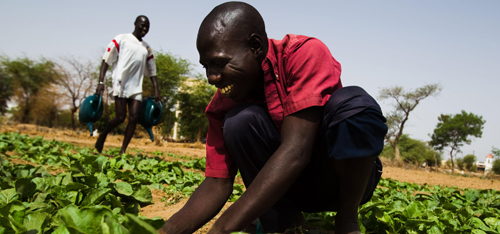Niger
More than 80 percent of Niger’s 17.8 million people rely on agriculture for their food and income. Most grow crops and raise livestock on small family farms; however, drought and flooding are increasingly threatening livelihoods and food security.
Back-to-back food and nutrition crises in Niger over the last few decades have pushed more people into hunger and poverty, and worn down their ability to withstand shocks. An estimated 4.2 million people are at risk of food insecurity in this drought-prone Sahelian country, considered one of the world’s poorest and least developed.
Conflict in neighbouring countries, which has sparked the return of economic migrants as well as an influx of refugees, has further aggravated the food situation in Niger.
IPPM programme in Niger
FAO's IPPM activities in Niger support the Government's 3N initiative - les Nigériens Nourrissent les Nigériens (Nigeriens Nourish Nigeriens) - which aims to strengthen the country's resilience to food and nutrition crises by helping smallholder farmers increase cereal yields, irrigate more land and diversify production systems, among others.
IPPM in Niger seeks to promote balanced fertilization for healthy crop growth, reduce the use of harmful pesticides and help farmers adapt production to a changing climate. By encouraging farmers to diversify agricultural and livestock production, and by supporting the production and use of certified seed, IPPM is working to ensure that families in Niger have access to more abundant and nutritionally diverse food.
The IPPM coordination unit has also supported capacity development activities through the regional Initiative to boost rice production.
In Niger, the IPPM programme began in 2010 and has since trained a total of 5 432 farmers, 18 percent of them women, through its farmer field school network.
IPPM projects in Niger
- Initiative to boost rice production in West Africa (regional)
- POPs reduction in Niger and Senegal Rivers (regional)
Partners
The IPPM programme in Niger works with a broad spectrum of partners to achieve its goals, such as: Direction générale de l’Agriculture; Direction générale de la protection des végétaux; Institut national de recherche agronomique du Niger; Office National des Aménagements Hydro-Agricoles; PASADEM and PPHSA projects; and local cooperatives (Toula, Say, Gaya, Tillakaina and Daykaina).
The programme would like to thank its resource partners for their continued support: Global Environment Facility; Government of Niger; Government of the Kingdom of Spain; International Fund for Agricultural Development; and United Nations Environment Programme.

